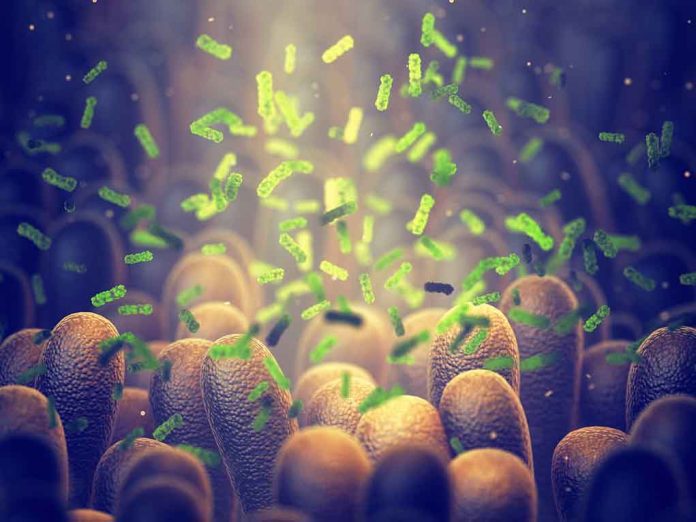
The protein you choose for dinner could dramatically reshape your gut bacteria, with far-reaching implications for your long-term health, according to groundbreaking new research.
At a Glance
- Different dietary protein sources (animal vs. plant) significantly alter gut microbiome composition and function
- Protein source has a greater impact on gut bacteria than protein amount
- An egg white-based diet caused one bacterium to dominate and potentially break down protective gut mucus
- High animal protein consumption is linked to higher mortality rates compared to plant proteins
- Protein-microbiota interactions have crucial effects on metabolism, weight management, and overall health
How Different Proteins Transform Your Gut Microbiome
Scientists have discovered that the source of protein in your diet—whether from animals, plants, or other sources like yeast—significantly impacts the composition and function of your gut microbiome. Recent research using an integrated metagenomics-metaproteomics approach examined how seven different dietary protein sources affected the gut bacteria of mice, revealing substantial variations in microbial populations and metabolic functions. These changes weren’t minor—they were fundamental shifts in the gut ecosystem.
“The composition of the gut microbiome significantly changed every time we changed the protein source,” said Blakeley-Ruiz, one of the researchers behind a groundbreaking study on protein sources and gut health.
Perhaps most surprisingly, researchers found that the source of dietary protein had a greater effect on gut microbiota than the amount consumed. This challenges conventional wisdom about protein consumption and suggests that quality may matter more than quantity when it comes to nurturing beneficial gut bacteria. The protein source affected microbial load, species diversity, and caused significant changes in gut microbiota functions related to fermentation, gene expression, and metabolism.
The Egg White Problem
One of the most striking findings involved egg white protein. In mice fed an egg white-based diet, researchers observed something alarming: a single bacterium dominated the gut environment and activated enzymes that break down glycans—complex sugars that form part of the protective mucus lining in your intestines. This could potentially compromise gut barrier function and lead to inflammation or other health issues over time.
“This could be really meaningful, health wise,” Blakeley-Ruiz said. “In the egg white diet, in particular, one bacterium took over and activated a bunch of glycan-degrading enzymes. We then grew this bacterium in the lab and found that the glycan-degrading enzymes it produced in media containing egg white protein were similar to those produced in media containing mucin.”
The implications are significant—your body’s protective gut barrier could be compromised by certain protein choices. Other protein sources, like brown rice, showed different effects, increasing amino acid degradation in the mouse gut microbiome rather than threatening the mucus layer. These findings highlight how specific our gut bacteria’s responses are to different protein types.
Protein Choice and Mortality
Beyond gut health, your protein choices may influence your longevity. Studies have found associations between protein sources and mortality rates that can’t be ignored. Animal proteins, particularly red meat, appear to have different health outcomes compared to plant-based proteins when consumed regularly over time. Some evidence suggests these differences stem from how gut bacteria process the different protein types.
The gut microbiota can convert dietary proteins into compounds linked to disease. For example, certain bacteria transform components in red meat into trimethylamine N-oxide (TMAO), a compound associated with atherosclerosis and obesity. Plant proteins typically don’t trigger these same pathways, which may partly explain their different health outcomes. The research suggests that replacing some animal protein with plant protein sources could reduce mortality risk.
Protein, Weight Management and Health
High-protein diets have become popular for weight loss, but their effects on obesity and long-term health are complex and not fully understood. Recent experiments showed that mice on protein-rich diets experienced significant weight loss, reduced body fat, and immediate changes in their gut microbiome. However, not all protein sources have the same effect on weight management.
Casein and whey proteins from dairy have shown potential in preventing obesity in rodent studies, with casein being particularly effective. Epidemiological studies suggest dairy and vegetarian protein sources may protect against obesity, while high meat intake, especially red meat, is associated with weight gain. These differences appear to be mediated through interactions with gut bacteria, which influence how the body processes and stores energy from food.
Practical Implications for Your Diet
The emerging research on protein sources and gut health offers practical implications for everyday eating. Varying protein sources may help maintain a diverse gut microbiome, which is associated with better health outcomes. Including a mix of plant proteins like legumes, nuts, and whole grains alongside more carefully selected animal proteins could provide a balanced approach that supports gut health while meeting nutritional needs.
It’s worth noting that gut microbiota show resilience, and diet-induced changes may be temporary. This suggests that consistent dietary habits, rather than short-term interventions, are likely needed to maintain beneficial gut bacteria populations. For those with specific health concerns or digestive issues, considering protein sources as part of a comprehensive approach to gut health could offer additional benefits beyond basic nutrition.





